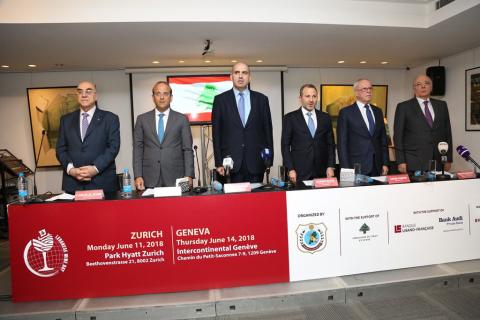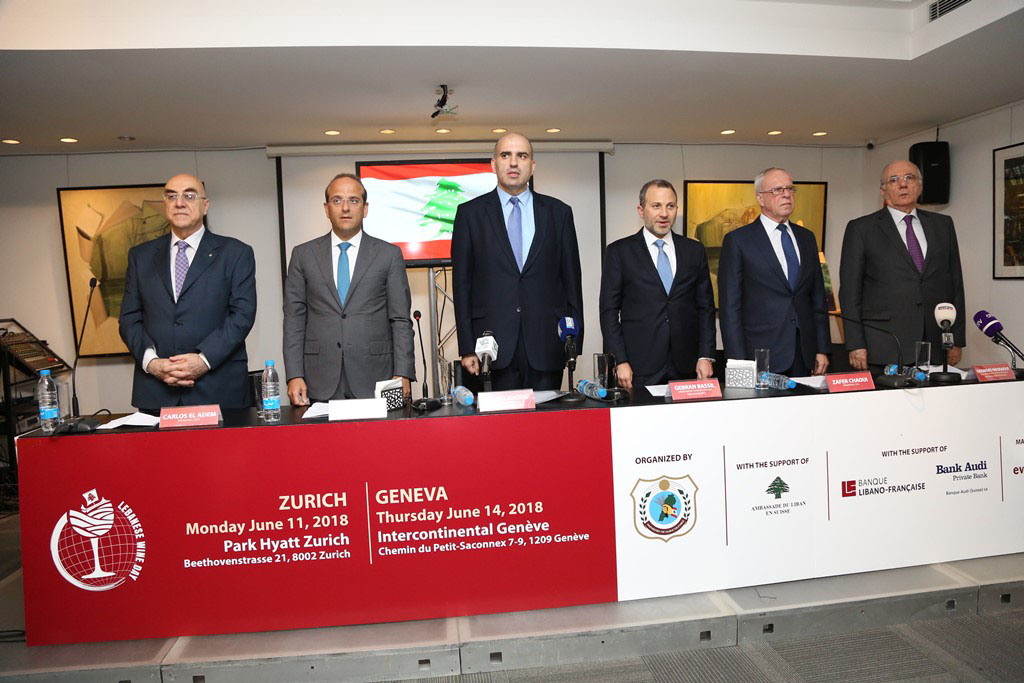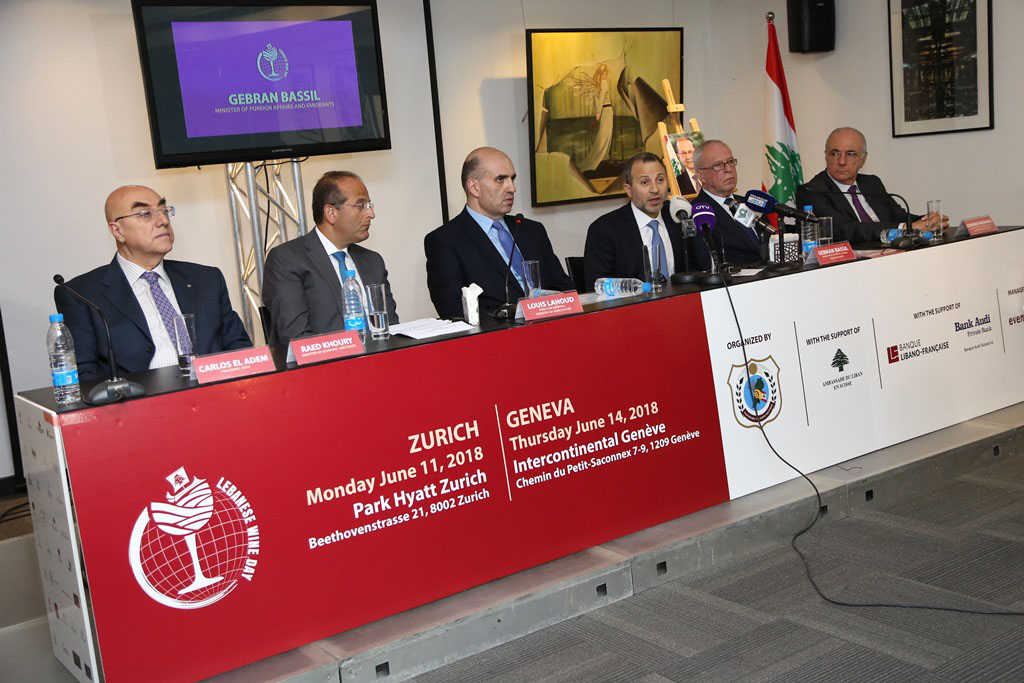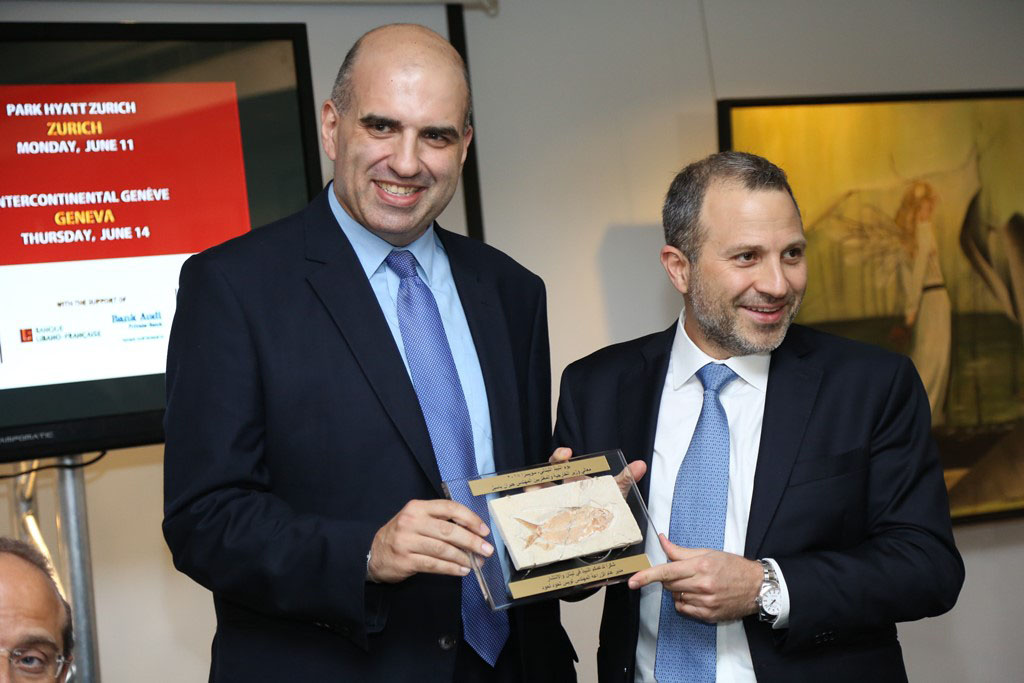
 34 Lebanese companies are taking part in the Lebanese Wine Day 2018, to be held in Zurich on June 11 and in Geneva on June 14, organized by the Ministry of Agriculture and managed by Eventions. The Minister of Foreign Affairs and Emigrants in the caretaker government, Mr. Gibran Bassil, said at a press conference held on Thursday, that the Ministry of Foreign Affairs will appoint economic attachés in 20 countries to promote Lebanese products.
34 Lebanese companies are taking part in the Lebanese Wine Day 2018, to be held in Zurich on June 11 and in Geneva on June 14, organized by the Ministry of Agriculture and managed by Eventions. The Minister of Foreign Affairs and Emigrants in the caretaker government, Mr. Gibran Bassil, said at a press conference held on Thursday, that the Ministry of Foreign Affairs will appoint economic attachés in 20 countries to promote Lebanese products.
Mr. Bassil said, at a press conference held in Beirut Symposium, in Sin El Fil, in the presence of the Minister of Economy and Trade in the caretaker government, Mr. Raed Khoury, the Director General of the Ministry of Agriculture, Eng. Louis Lahoud, representing the Minister of Agriculture, MP Salim Aoun, as well as a number of Directors Generals and owners of wineries, that “wine, in addition to other Lebanese products, pushed the Ministry of Foreign Affairs to launch economic diplomacy and revealed to which extent the State is neglecting wine and all other Lebanese food products.” He added: “Our State is neglecting its people, its industry, its agriculture, and distinguished Lebanese products. We do not deploy sufficient efforts to market our products on foreign markets. We are called upon everyday to do more in order to help Lebanese products access global markets.”
 Mr. Bassil declared, within this regard, that “the Ministry of Foreign Affairs completed the examinations for 20 economic attachés around the globe, who will be dispatched to 20 countries and major capitals of the world, the unique mission of whom consists of marketing Lebanese products abroad and making such a huge difference as they are called upon to do so.” He continued: “It is shameful not to have economic attachés abroad but in 2018. However, let us be optimistic since we have started a new path enabling us to grant interest to our missions abroad to do their job.”
Mr. Bassil declared, within this regard, that “the Ministry of Foreign Affairs completed the examinations for 20 economic attachés around the globe, who will be dispatched to 20 countries and major capitals of the world, the unique mission of whom consists of marketing Lebanese products abroad and making such a huge difference as they are called upon to do so.” He continued: “It is shameful not to have economic attachés abroad but in 2018. However, let us be optimistic since we have started a new path enabling us to grant interest to our missions abroad to do their job.”
He recalled: “It is my duty to ask the embassies not to serve but Lebanese wine during their receptions (…). It is shameful that Lebanese people meet abroad and do not share and drink Lebanese wine or Arak. It is not only the consumption of this product that increases day after day, but also its quality. Therefore, it is the duty of all responsible administrations to protect Lebanese wine through measures to be taken on border controls regarding alcoholic drinks.”
He added: “We should endeavor to market Lebanese Arak as we did with Lebanese wine, knowing that Arak is a unique product which Lebanon is its only producer, and thus has a greater opportunity to breakthrough and compete. We have become aware that a great number of wine producers produce Arak or are capable of that. It is then up to us to encourage them to produce more.”
He continued: “We are today happy to go to Geneva and Zurich. But let us not forget wider markets, such as Russia, China, India, North and South Korea. We can go to these countries where competition is lower and the breakthrough capacity larger, with a great potential to market Lebanese wine.”
He insisted on the “responsibility of consumers, whether they are residents or emigrants, in always choosing Lebanese wine.”
He added: “The more we drink Lebanese wine, the more we anchor Lebanese people in their land and we open for them an illuminated window in their life.”

Lahoud
Mr. Lahoud noted that “the annual gathering for the launching of the Lebanese Wine Day in one of the global cities of the world has become an awaited opportunity for wine producers as well as Lebanese wine lovers, and is considered to be a gathering for wine experts to exchange expertise”. He explained that “the history of Lebanese wine industry goes back to the era of Phoenicians and their ancestors, at a time when wine was an integral part of the history of all communities and civilizations which have passed by Lebanon. It was a must at all major social receptions and ceremonies, adding mirth and joy to them.” He noted that “Lebanese wine has become today an international ambassador to Lebanon abroad.”
Mr. Lahoud said that “the Ministry of Agriculture, being aware of the major role to be played by wine, with its socio-economic impact on the national level, continues to seek new markets by organizing the Lebanese Wine Days all over the world.”
He indicated that “the Lebanese Wine Day was held for the first time in Paris, then in Berlin in 2014, then in New York in 2016 and in San Francisco in 2017.” He also explained that “Switzerland has been chosen this year, considering the potential access it grants to Lebanese products to its markets. It was hence a step to support the wine sector, although Lebanese wine is not new at all on the Swiss markets.” He also highlighted that the focus was “on the quality and excellence of Lebanese wine, not on the quantity.”
He added that the 34 Lebanese wine producers participating in this event have decided “to cooperate with the Ministry of Agriculture in order to disseminate the culture of Lebanese wine across the globe, to become an example to follow suit in other sectors, such as Arak soon then Lebanese traditional industries we are proud of, as we are of our roots which are well-anchored in the East.”
Mr. Lahoud concluded his speech by thanking “whoever has contributed and will contribute to marketing Lebanese production.”
Khoury
As for the Minister Raed Khoury, he described the Lebanese wine as “the source of pride of the Lebanese industry and agriculture”, noting that this industry has made Lebanon well-known, thus expanding with the expansion of the Lebanese Diaspora all over the world, to reveal the true and cultural facet of Lebanon.”
He estimated that “the sector has a great significance on several levels”, clarifying that its commercial interest lies “in the increase of Lebanese wine exports by more than 15% in the past five years”. “The industry plays also a major role in promoting regional tourism in Lebanon, such as in the Bekaa, the North and Mount Lebanon.” He noted “the cultural significance of wine as a main element in the Lebanese cuisine and highlighted the capacity of the sector, thus reflecting the image of renewal, diversity, openness and culture in Lebanon.”
He considered that, “in view of the major development this sector has witnessed throughout the years, it is essential to improve the conditions of production, ensure the conditions of safety, and adopt appropriate laws and legislations according to international standards, thus contributing to the growth and development of the sector.”
He asserted that “the Government grants importance to this sector, particularly to find new markets for its products and promote Lebanese wine on global markets.” He insisted, in this regard, “on enhancing cooperation between all concerned ministries and between the private and public sectors in order to find ways to alleviate obstacles hindering Lebanese exports, particularly regarding complicated export procedures to some countries, in addition to taking necessary measures to improve the quality of wine and speed up its pace of production.”
He added: “We firmly believe in the significant role of the Lebanese wine sector, especially that it is one of the most resistant sectors in the face of all socio-economic challenges.” He attributed that “to the special and efficient role of the private sector in the development of wine industry in Lebanon. Therefore, the Government cannot but endeavor to uphold the efforts of the private sector in this regard, which is undoubtedly beneficial for the whole economy in order to promote economic growth and create more work opportunities.”
Shawi
Mr. Zafer Shawi, President of the Vine and Wine Federation, estimated that “the interest the Lebanese Ministry of Agriculture expresses to the wine sector is a source of pride, especially in the light of the arduous efforts deployed by the Ministry itself, most importantly allocating a yearly budget to organize the Lebanese Wine Days abroad.”
He indicated that “Lebanon is a distinguished producer of wine, the quality of which competes with that of the major wine producing countries all over the world.” He highlighted that “Lebanese wine is exported to more than 35 countries”, noting that “it is not only tasted by the Lebanese Diaspora, but is well-known to the inhabitants of these countries and available in their most famous restaurants.” He underlined “the current cooperation and coordination between the Vine and Wine Federation and the Lebanese embassies and consulates abroad, thanks to the directives and the support of the Ministry of Foreign Affairs, whether through tasting ceremonies or master classes organized about Lebanese wine or by offering Lebanese wine at all receptions exclusively.” Mr. Shawi thanked the Minister of Foreign Affairs for “mentioning wine and insisting on it at the conference on the potential of emigrants, indicating that it is the duty of each and every Lebanese living abroad to taste it and encourage its consumption.” He also revealed that “a draft decision in cooperation and coordination with concerned ministries is under preparation to regulate the import of foreign wines, as it is the case in the vast majority of countries around the globe”, hoping that “such a decision will be signed and will enter into force to become the starting point of other decisions which will protect national production before it becomes too late.”
He noted that efforts are deployed, in coordination with concerned ministries, to “activate the role of the Vine and Wine Federation to become an efficient entity to protect Lebanese production, especially that Lebanon has become a dynamic member of the International Organization of Vine and Wine (OIV), since the Director General of the Ministry of Agriculture is the Vice-President of the Technical Committee of the Organization.
Al Azem
Mr. Carlos El Azem, President of the National Institute of Vine and Wine, said that “Lebanon which has always been known as the Switzerland of the East, sends its best ambassador to the heart of Switzerland itself”, noting that “it is an authentic country in vineyards and wine industry.” He attributed “the presence of the Lebanese wine in one of the main European countries to the Ministry of Agriculture and to its Director General, Mr. Louis Lahoud, who cherishes Lebanese wine and contributed to its launching on the international scene.”
He added: “Our plains and mountains, our sun and nature, the specificity of our climate, the love of our land and the special knowledge we have will turn every grape into an exquisite sip of wine.” He noted that “Lebanese wine starts today, with sheer confidence, a new journey across the globe, raising high the name of Lebanon in the major cities and capitals of the world.”
Nasrawi
Mr. George Nasrawi, Vice-President of the Association of Lebanese Industrialists, explained that “the Association welcomes every initiative to support any industrial sector in Lebanon. What if this sector is the wine sector, which is special, considering its authentic history and its promising future?”
He recalled the history of vineyards and wine production in Lebanon and considered that “the development of wine production has tridimensional repercussions on the Lebanese economy, with a direct impact on the industrial, agricultural and tourism sectors.”
He noted that “wine industry succeeded in imposing itself on the global markets, thanks to its quality, thus becoming well-known and highly demanded by wine tasters around the world.” He added: “Although we are unable to compete with a large production, we do focus on excellent quality and on developing and improving this industry.”
He also lauded the efforts of the Minister of Agriculture and the Director General of the Ministry of Agriculture, as well as concerned ministries, thanking the Ministry of Foreign Affairs “since its support has a positive impact on the expansion of Lebanese industry.”
On the program
Zurich will be the first stopover of the Lebanese Wine Day, on June 11, at the Park Hyatt Hotel. In addition to tasting sessions, master classes will be given by Thomas Vaterlaus, editor-in-chief of Vinum. Following a reception held by the ambassador of Lebanon to Switzerland on June 12, in the honor of the Lebanese delegation in the capital Bern, the delegation will move to Geneva where the Lebanese Wine Day will be held on June 14 at Intercontinental Hotel, during which Mrs. Diala Younes Lavenu, President of Association des Oenologues de Bordeaux, of Lebanese origin, will hold master classes. A press conference will also be held.
Categories
- Log in to post comments